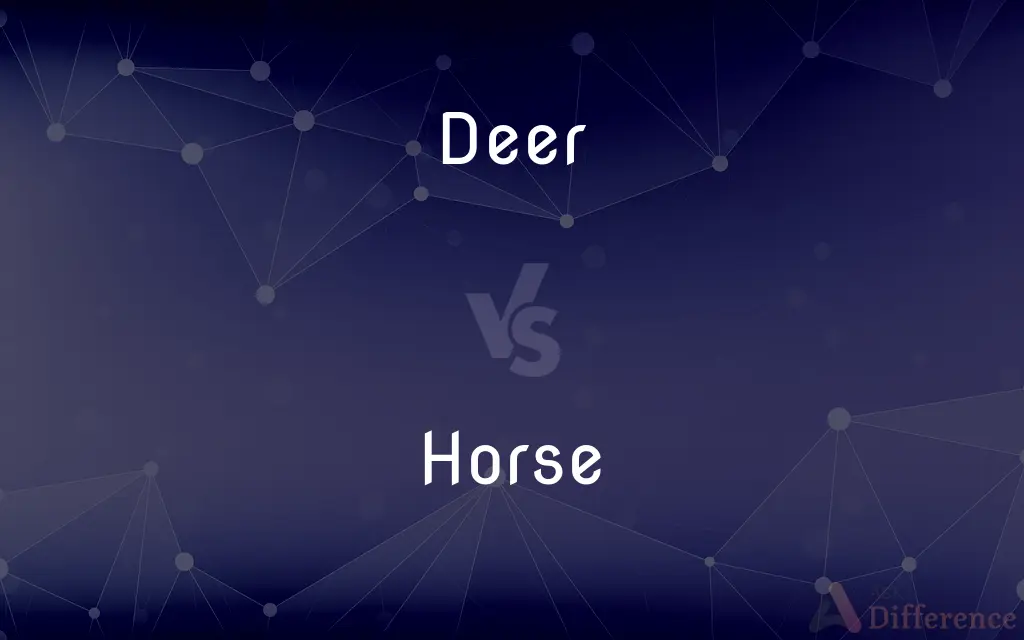Deer vs. Horse — What's the Difference?
By Tayyaba Rehman — Updated on November 3, 2023
Deer are wild, antlered ruminants, while horses are domesticated, hoofed mammals used for riding and work.

Difference Between Deer and Horse
Table of Contents
ADVERTISEMENT
Key Differences
Deer are wild, hoofed animals known for their elegant antlers, which are typically grown by males and shed annually. Horses are domesticated animals with solid hooves and a long history of being used for transportation, work, and companionship by humans. Both are mammals, but they belong to different families: deer to the Cervidae, and horses to the Equidae.
The deer is generally smaller and more agile, adapted for quick movement through dense forests. Horses, on the other hand, have muscular builds and are adapted for speed and endurance over open terrain. Deer are browsers, feeding on a variety of vegetation, whereas horses are grazers, primarily consuming grass.
Deer species are varied, ranging from the small pudu to the large moose, and are native to many different ecosystems across the world. Horses have been bred by humans into numerous breeds with specialized abilities, such as racing, draft work, or riding. While deer live in the wild, horses can be found both in the wild and in domestic settings.
Behaviorally, deer are generally more solitary or live in small family groups, with some species forming larger herds during certain seasons. Horses are inherently social animals, often living in groups called herds, and they have a complex social structure. Domestic horses, in particular, form strong bonds with humans.
In terms of reproduction, deer fawns are born spotted and camouflaged, able to stand shortly after birth. Horse foals are also able to stand and run soon after birth, but they are typically larger and do not have the same type of natural camouflage. Both deer and horses exhibit a high level of parental care.
ADVERTISEMENT
Comparison Chart
Family
Cervidae
Equidae
Habitat
Mostly forested regions
Diverse, including plains and human settlements
Domestication
Wild species
Domesticated species
Social Structure
Solitary or small herds
Social, live in herds
Notable Features
Antlers (mostly in males)
Manes, strong bodies for work/riding
Usage
Not typically used for work
Work, transportation, companionship
Coat
Often spotted in youth for camouflage
Uniform coat, bred for various purposes
Compare with Definitions
Deer
Deer are known for their graceful movement
The deer bounded across the meadow effortlessly.
Horse
Horses are large, domesticated mammals with hooves
The horse galloped across the open field.
Deer
Deer species vary widely in size
White-tailed deer are common in North American forests.
Horse
Horses are known for their strength and speed
The racehorse sprinted ahead of the others.
Deer
Deer are adapted to a variety of habitats
The deer adapted quickly to the changing seasons.
Horse
Horse breeds are diverse, serving many purposes
The Clydesdale horse is used for heavy draft work.
Deer
Deer often have reddish-brown coats
The fawn's deer coat blended into the autumn leaves.
Horse
Horses develop strong bonds with humans
The therapy horse gently nuzzled the child.
Deer
Deer are ruminant mammals with distinct antlers
A majestic deer was spotted at the edge of the woods.
Horse
The horse (Equus ferus caballus) is a domesticated one-toed hoofed mammal. It belongs to the taxonomic family Equidae and is one of two extant subspecies of Equus ferus.
Deer
Deer or true deer are hoofed ruminant mammals forming the family Cervidae. The two main groups of deer are the Cervinae, including the muntjac, the elk (wapiti), the red deer, the fallow deer, and the chital; and the Capreolinae, including the reindeer (caribou), the roe deer, the mule deer, and the moose.
Horse
A large plant-eating domesticated mammal with solid hoofs and a flowing mane and tail, used for riding, racing, and to carry and pull loads.
Deer
Any of various hoofed ruminant mammals of the family Cervidae, characteristically having deciduous antlers borne chiefly by the males. The deer family includes the white-tailed deer, elk, moose, and caribou.
Horse
A frame or structure on which something is mounted or supported, especially a sawhorse.
Deer
A ruminant mammal with antlers and hooves of the family Cervidae, or one of several similar animals from related families of the order Artiodactyla.
Horse
A unit of horsepower
A 63-horse engine
Deer
(in particular) One of the smaller animals of this family, distinguished from a moose or elk
I wrecked my car after a deer ran across the road.
Horse
Heroin.
Deer
The meat of such an animal; venison.
Oh, I've never had deer before.
Horse
An obstruction in a vein.
Deer
Any animal, especially a quadrupedal mammal as opposed to a bird, fish, etc.
Horse
Provide (a person or vehicle) with a horse or horses
Six men, horsed, masked, and armed
Deer
Any animal; especially, a wild animal.
Mice and rats, and such small deer.
The camel, that great deer.
Horse
A large hoofed mammal (Equus caballus) having a short coat, a long mane, and a long tail, domesticated since ancient times and used for riding and for drawing or carrying loads.
Deer
A ruminant of the genus Cervus, of many species, and of related genera of the family Cervidæ. The males, and in some species the females, have solid antlers, often much branched, which are shed annually. Their flesh, for which they are hunted, is called venison.
Horse
An adult male horse; a stallion.
Deer
Distinguished from Bovidae by the male's having solid deciduous antlers
Horse
Any of various equine mammals, such as the wild Asian species Przewalski's horse or certain extinct forms related ancestrally to the modern horse.
Horse
A frame or device, usually with four legs, used for supporting or holding.
Horse
(Sports) A vaulting horse.
Horse
(Slang) Heroin.
Horse
Often horses Horsepower
A muscle car with 400 horses under the hood.
Horse
Mounted soldiers; cavalry
A squadron of horse.
Horse
A block of rock interrupting a vein and containing no minerals.
Horse
A large block of displaced rock that is caught along a fault.
Horse
To provide with a horse.
Horse
To haul or hoist energetically
"Things had changed little since the days of the pyramids, with building materials being horsed into place by muscle power" (Henry Allen).
Horse
To be in heat. Used of a mare.
Horse
Of or relating to a horse
A horse blanket.
Horse
Mounted on horses
Horse guards.
Horse
Drawn or operated by a horse.
Horse
Larger or cruder than others in the same category
Horse pills.
Horse
A hoofed mammal, Equus ferus caballus, often used throughout history for riding and draft work.
A cowboy's greatest friend is his horse.
Horse
Any member of the species Equus ferus, including the Przewalski's horse and the extinct Equus ferus ferus.
Horse
(zoology) Any current or extinct animal of the family Equidae, including zebras and asses.
These bone features, distinctive in the zebra, are actually present in all horses.
Horse
Cavalry soldiers (sometimes capitalized when referring to an official category).
We should place two units of horse and one of foot on this side of the field.
All the King's horses and all the King's men, couldn't put Humpty together again.
Horse
A component of certain games.
Horse
(slang) A large and sturdy person.
Every linebacker they have is a real horse.
Horse
(historical) A timber frame shaped like a horse, which soldiers were made to ride for punishment.
Horse
Equipment with legs.
Horse
In gymnastics, a piece of equipment with a body on two or four legs, approximately four feet high, sometimes (pommel horse) with two handles on top.
She's scored very highly with the parallel bars; let's see how she does with the horse.
Horse
A frame with legs, used to support something.
A clothes horse; a sawhorse
Horse
(nautical) Type of equipment.
Horse
A rope stretching along a yard, upon which men stand when reefing or furling the sails; footrope.
Horse
A breastband for a leadsman.
Horse
An iron bar for a sheet traveller to slide upon.
Horse
A jackstay.
Horse
(mining) A mass of earthy matter, or rock of the same character as the wall rock, occurring in the course of a vein, as of coal or ore; hence, to take horse (said of a vein) is to divide into branches for a distance.
Horse
(US) An informal variant of basketball in which players match shots made by their opponent(s), each miss adding a letter to the word "horse", with 5 misses spelling the whole word and eliminating a player, until only the winner is left. Also HORSE, H-O-R-S-E or H.O.R.S.E. (see H-O-R-S-E).
Horse
(uncountable) The flesh of a horse as an item of cuisine.
Horse
(prison slang) A prison guard who smuggles contraband in or out for prisoners.
Horse
A translation or other illegitimate aid in study or examination.
Horse
Horseplay; tomfoolery.
Horse
(slang) Heroin drug.
Horse
(intransitive) To frolic, to act mischievously. (Usually followed by "around".)
Horse
(transitive) To play mischievous pranks on.
Horse
(transitive) To provide with a horse; supply horses for.
Horse
(obsolete) To get on horseback.
Horse
To sit astride of; to bestride.
Horse
(of a male horse) To copulate with (a mare).
Horse
To take or carry on the back.
Horse
To place (someone) on the back of another person, or on a wooden horse, chair, etc., to be flogged or punished.
Horse
(by extension) To flog.
Horse
(transitive) To pull, haul, or move (something) with great effort, like a horse would.
Horse
(informal) To cram (food) quickly, indiscriminately or in great volume.
Horse
To urge at work tyrannically.
Horse
To charge for work before it is finished.
Horse
A hoofed quadruped of the genus Equus; especially, the domestic horse (Equus caballus), which was domesticated in Egypt and Asia at a very early period. It has six broad molars, on each side of each jaw, with six incisors, and two canine teeth, both above and below. The mares usually have the canine teeth rudimentary or wanting. The horse differs from the true asses, in having a long, flowing mane, and the tail bushy to the base. Unlike the asses it has callosities, or chestnuts, on all its legs. The horse excels in strength, speed, docility, courage, and nobleness of character, and is used for drawing, carrying, bearing a rider, and like purposes.
Horse
The male of the genus Equus, in distinction from the female or male; usually, a castrated male.
Horse
Mounted soldiery; cavalry; - used without the plural termination; as, a regiment of horse; - distinguished from foot.
The armies were appointed, consisting of twenty-five thousand horse and foot.
Horse
A frame with legs, used to support something; as, a clotheshorse, a sawhorse, etc.
Horse
A frame of timber, shaped like a horse, on which soldiers were made to ride for punishment.
Horse
Anything, actual or figurative, on which one rides as on a horse; a hobby.
Horse
A mass of earthy matter, or rock of the same character as the wall rock, occurring in the course of a vein, as of coal or ore; hence, to take horse - said of a vein - is to divide into branches for a distance.
Horse
A translation or other illegitimate aid in study or examination; - called also trot, pony, Dobbin.
Horse
Heroin.
Horse
Horsepower.
Horse
To provide with a horse, or with horses; to mount on, or as on, a horse.
Horse
To sit astride of; to bestride.
Horse
To mate with (a mare); - said of the male.
Horse
To take or carry on the back; as, the keeper, horsing a deer.
Horse
To place on the back of another, or on a wooden horse, etc., to be flogged; to subject to such punishment.
Horse
To get on horseback.
Horse
Solid-hoofed herbivorous quadruped domesticated since prehistoric times
Horse
A padded gymnastic apparatus on legs
Horse
Troops trained to fight on horseback;
500 horse led the attack
Horse
A framework for holding wood that is being sawed
Horse
A chessman in the shape of a horse's head; can move two squares horizontally and one vertically (or vice versa)
Horse
Provide with a horse or horses
Horse
Horses have been vital for human transport
She rode her horse through the ancient trail.
Common Curiosities
Can deer be domesticated like horses?
Deer are not typically domesticated, unlike horses which are.
What's the primary use of horses?
Horses are used for riding, work, and companionship.
How fast can horses run compared to deer?
Horses can often run faster and longer distances than deer.
What do deer eat?
Deer are browsers that eat leaves, twigs, and other plant matter.
Do all deer grow antlers?
Most male deer grow antlers, but not the females.
Do deer have good night vision?
Deer have excellent night vision, which is not as strong in horses.
What is a group of horses called?
A group of horses is known as a herd.
What’s the lifespan of a horse compared to a deer?
Horses generally live longer than deer, often 25-30 years or more.
What sounds do horses make?
Horses neigh, whinny, and nicker.
Are horses native to America?
Horses were reintroduced to America by Europeans; they are not originally native.
Are horses herbivores?
Yes, horses are herbivores that primarily eat grass.
Can you find deer in urban areas?
Deer sometimes venture into urban areas, but they primarily live in the wild.
Are deer social animals?
Deer can be social but do not have as complex social structures as horses.
How do deer react to predators?
Deer typically flee from predators, using their agility to escape.
Are there any deer species as large as horses?
The moose is the largest deer species and can be as large as a horse.
Share Your Discovery

Previous Comparison
Relevant vs. Poignant
Next Comparison
Solicitate vs. SolicitAuthor Spotlight
Written by
Tayyaba RehmanTayyaba Rehman is a distinguished writer, currently serving as a primary contributor to askdifference.com. As a researcher in semantics and etymology, Tayyaba's passion for the complexity of languages and their distinctions has found a perfect home on the platform. Tayyaba delves into the intricacies of language, distinguishing between commonly confused words and phrases, thereby providing clarity for readers worldwide.














































